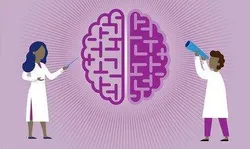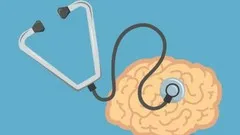
Behavioral Neuroscience: Contrasting Tests for Anxiety and Depression 
This course provides an overview of the use of behavioral tests to measure anxiety and depression in laboratory mice. Students will learn to critically evaluate the different tests and how they can affect the interpretation of results. They will also gain experience in collecting behavioral data from mice and analyzing the data. ▼
ADVERTISEMENT
Course Feature
![]() Cost:
Cost:
Free
![]() Provider:
Provider:
Edx
![]() Certificate:
Certificate:
Paid Certification
![]() Language:
Language:
English
![]() Start Date:
Start Date:
Self paced
Course Overview
❗The content presented here is sourced directly from Edx platform. For comprehensive course details, including enrollment information, simply click on the 'Go to class' link on our website.
Updated in [March 06th, 2023]
This online course on behavioral neuroscience provides an in-depth exploration of scientific research related to mental health conditions such as anxiety and depression. Through enrollment in this course, learners will gain an understanding of how to critically evaluate the use of different behavioral tests for anxiety and depression in laboratory mice, evaluate how different behavioral tests can affect the interpretation of results, collect behavioral data from mouse videos from compulsive-like, non-compulsive-like, and randomly bred mouse strains, analyze behavioral data, interpret and discuss results in the context of human psychiatric disorders and the mouse model of OCD, describe key characteristics of anxiety and depression in humans and in animal models, compare and contrast compulsive-like, anxiety-like, and depression-like behaviors in mice to equivalent conditions in humans and human behavior, formulate original research hypotheses, and describe and discuss how basic research contributes to the animal model of OCD and how it may have the potential to contribute to a better understanding of mental health, behavioral health and improving healthcare and the human condition. Learners should be free of objections to using mice in research.
[Applications]
Upon completion of this course, learners will have the knowledge and skills to apply the concepts learned to their own research. They will be able to critically evaluate the use of different behavioral tests for anxiety and depression in laboratory mice, collect behavioral data from mouse videos, analyze behavioral data, interpret and discuss results in the context of human psychiatric disorders and the mouse model of OCD, compare and contrast compulsive-like, anxiety-like, and depression-like behaviors in mice to equivalent conditions in humans and human behavior, and formulate original research hypotheses. Learners will also have a competency in describing key characteristics of anxiety and depression in humans and in animal models, as well as a capability to describe and discuss how basic research contributes to the animal model of OCD and how it may have the potential to contribute to a better understanding of mental health, behavioral health and improving healthcare and the human condition.
[Career Paths]
Job position paths recommended for learners of this course include:
1. Behavioral Neuroscience Research Scientist: Behavioral neuroscience research scientists use their knowledge of neuroscience to conduct research on mental health conditions such as anxiety and depression. They use a variety of methods, such as behavioral tests, to study the brain and its functions. They analyze data and develop hypotheses to further their research. This field is growing rapidly, as more research is being conducted on mental health conditions.
2. Clinical Psychologist: Clinical psychologists use their knowledge of neuroscience to diagnose and treat mental health conditions. They use a variety of methods, such as behavioral tests, to assess and diagnose patients. They also provide psychotherapy and other treatments to help patients manage their mental health conditions. This field is growing rapidly, as more people are seeking help for mental health issues.
3. Mental Health Counselor: Mental health counselors use their knowledge of neuroscience to provide counseling and support to individuals with mental health conditions. They use a variety of methods, such as behavioral tests, to assess and diagnose patients. They also provide psychotherapy and other treatments to help patients manage their mental health conditions. This field is growing rapidly, as more people are seeking help for mental health issues.
4. Neuropsychologist: Neuropsychologists use their knowledge of neuroscience to diagnose and treat mental health conditions. They use a variety of methods, such as behavioral tests, to assess and diagnose patients. They also provide psychotherapy and other treatments to help patients manage their mental health conditions. This field is growing rapidly, as more research is being conducted on the brain and its functions.
[Education Paths]
Recommended Degree Paths:
1. Bachelor of Science in Neuroscience: This degree program provides students with a comprehensive understanding of the structure and function of the nervous system, as well as the development of research skills. Students will learn about the anatomy and physiology of the brain, the molecular and cellular basis of neural communication, and the development of neural networks. They will also gain an understanding of the latest research in neuroscience, including the development of new treatments for neurological disorders. This degree is becoming increasingly popular as the demand for neuroscience professionals grows.
2. Master of Science in Neuroscience: This degree program provides students with a more in-depth understanding of the structure and function of the nervous system. Students will learn about the anatomy and physiology of the brain, the molecular and cellular basis of neural communication, and the development of neural networks. They will also gain an understanding of the latest research in neuroscience, including the development of new treatments for neurological disorders. This degree is becoming increasingly popular as the demand for neuroscience professionals grows.
3. Doctor of Philosophy in Neuroscience: This degree program provides students with a comprehensive understanding of the structure and function of the nervous system, as well as the development of research skills. Students will learn about the anatomy and physiology of the brain, the molecular and cellular basis of neural communication, and the development of neural networks. They will also gain an understanding of the latest research in neuroscience, including the development of new treatments for neurological disorders. This degree is becoming increasingly popular as the demand for neuroscience professionals grows.
4. Master of Science in Behavioral Neuroscience: This degree program provides students with a comprehensive understanding of the structure and function of the nervous system, as well as the development of research skills related to the study of behavior. Students will learn about the anatomy and physiology of the brain, the molecular and cellular basis of neural communication, and the development of neural networks. They will also gain an understanding of the latest research in behavioral neuroscience, including the development of new treatments for mental health conditions such as anxiety and depression. This degree is becoming increasingly popular as the demand for behavioral neuroscience professionals grows.
Course Provider

Provider Edx's Stats at AZClass
Discussion and Reviews
0.0 (Based on 0 reviews)
Explore Similar Online Courses

Developing Mobile-specific Features with Flutter

Free course to Learn Complete Websites Setup from Scratch

Python for Informatics: Exploring Information

Social Network Analysis

Introduction to Systematic Review and Meta-Analysis

The Analytics Edge

DCO042 - Python For Informatics

Causal Diagrams: Draw Your Assumptions Before Your Conclusions

Whole genome sequencing of bacterial genomes - tools and applications

Control Your Subconscious Mind: Neuroscience Hidden Secrets

Perform an Excellent Neurological Bedside Exam


Start your review of Behavioral Neuroscience: Contrasting Tests for Anxiety and Depression